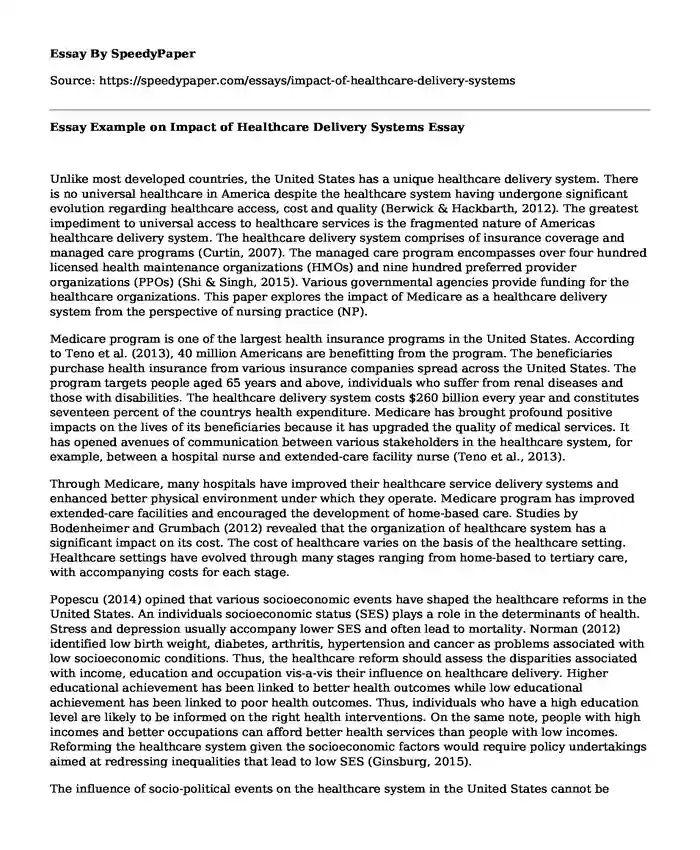
| Type of paper: | Essay |
| Categories: | Policy Health and Social Care Medicine |
| Pages: | 4 |
| Wordcount: | 829 words |
Unlike most developed countries, the United States has a unique healthcare delivery system. There is no universal healthcare in America despite the healthcare system having undergone significant evolution regarding healthcare access, cost and quality (Berwick & Hackbarth, 2012). The greatest impediment to universal access to healthcare services is the fragmented nature of Americas healthcare delivery system. The healthcare delivery system comprises of insurance coverage and managed care programs (Curtin, 2007). The managed care program encompasses over four hundred licensed health maintenance organizations (HMOs) and nine hundred preferred provider organizations (PPOs) (Shi & Singh, 2015). Various governmental agencies provide funding for the healthcare organizations. This paper explores the impact of Medicare as a healthcare delivery system from the perspective of nursing practice (NP).
Medicare program is one of the largest health insurance programs in the United States. According to Teno et al. (2013), 40 million Americans are benefitting from the program. The beneficiaries purchase health insurance from various insurance companies spread across the United States. The program targets people aged 65 years and above, individuals who suffer from renal diseases and those with disabilities. The healthcare delivery system costs $260 billion every year and constitutes seventeen percent of the countrys health expenditure. Medicare has brought profound positive impacts on the lives of its beneficiaries because it has upgraded the quality of medical services. It has opened avenues of communication between various stakeholders in the healthcare system, for example, between a hospital nurse and extended-care facility nurse (Teno et al., 2013).
Through Medicare, many hospitals have improved their healthcare service delivery systems and enhanced better physical environment under which they operate. Medicare program has improved extended-care facilities and encouraged the development of home-based care. Studies by Bodenheimer and Grumbach (2012) revealed that the organization of healthcare system has a significant impact on its cost. The cost of healthcare varies on the basis of the healthcare setting. Healthcare settings have evolved through many stages ranging from home-based to tertiary care, with accompanying costs for each stage.
Popescu (2014) opined that various socioeconomic events have shaped the healthcare reforms in the United States. An individuals socioeconomic status (SES) plays a role in the determinants of health. Stress and depression usually accompany lower SES and often lead to mortality. Norman (2012) identified low birth weight, diabetes, arthritis, hypertension and cancer as problems associated with low socioeconomic conditions. Thus, the healthcare reform should assess the disparities associated with income, education and occupation vis-a-vis their influence on healthcare delivery. Higher educational achievement has been linked to better health outcomes while low educational achievement has been linked to poor health outcomes. Thus, individuals who have a high education level are likely to be informed on the right health interventions. On the same note, people with high incomes and better occupations can afford better health services than people with low incomes. Reforming the healthcare system given the socioeconomic factors would require policy undertakings aimed at redressing inequalities that lead to low SES (Ginsburg, 2015).
The influence of socio-political events on the healthcare system in the United States cannot be gainsaid. Since 1970, political attitudes have shaped the U.S healthcare reform. The decision by the federal government to guarantee universal healthcare access has often been frustrated by competing political interests. As the United States healthcare system continues to evolve, it is characterized by uneven and increasing healthcare costs (Naylor & Kurtzman, 2011). Thus, DNP-prepared nurses are well-equipped to manage the transition by offering transitional care services (Zaccagnini & White, 2014). Adults who are chronically ill and are increasingly vulnerable can be assisted by doctoral-prepared nurses owing to their vast experience in the healthcare practice.
References
Berwick, D. M., & Hackbarth, A. D. (2012). Eliminating waste in US health care. Jama, 307(14), 1513-1516.
Bodenheimer, T., & Grumbach, K. (2012). Understanding health policy: A clinical approach (6th ed.). San Francisco, CA: McGraw-Hill Professional Publishing.
Curtin, L. (2007). The perfect storm: Managed care, aging adults, and a nursing shortage. Nursing Administration Quarterly, 31(2), 105114.
Ginsburg, P. B. (2005). Competition in healthcare: Evolution over the past decade. Health Affairs, 24(6), 15121522.
Naylor, M. D., & Kurtzman, E. T. (2011). Transitional care: Improving health outcomes and decreasing costs for at-risk chronically ill older adults. In Hinshaw, A. S. & Grady, P. A. (Eds.), Shaping health policy through nursing research (pp. 201213). New York, NY: Springer Publishing Co.
Norman, G. C. (2012). Basic Concepts, Commentary and Opportunities for Addressing Healthcare Inequality of Women with Disabilities. Health L. & Pol'y Brief, 6, 82.
Popescu, G. H. (2014). Economic aspects influencing the rising costs of health care in the United States. American Journal of Medical Research, 1(1), 47-47.
Shi, L., & Singh, D. A. (2015). Essentials of the US health care system. Jones & Bartlett Publishers.
Teno, J. M., Gozalo, P. L., Bynum, J. P., Leland, N. E., Miller, S. C., Morden, N. E., ... & Mor, V. (2013). Change in end-of-life care for Medicare beneficiaries: site of death, place of care, and health care transitions in 2000, 2005, and 2009. Jama, 309(5), 470-477.
Zaccagnini, M. E., & White, K. W. (2014). The Doctor of Nursing Practice Essentials: A new model for advanced practice nursing (2nd ed.). Sudbury, MA: Jones & Bartlett Publishers.
Cite this page
Essay Example on Impact of Healthcare Delivery Systems. (2019, Oct 24). Retrieved from https://speedypaper.net/essays/impact-of-healthcare-delivery-systems
Request Removal
If you are the original author of this essay and no longer wish to have it published on the SpeedyPaper website, please click below to request its removal:
- Essay Example: Leadership versus Management
- HRM Plan Essay Sample
- Economic Foundation of the US Healthcare Delivery
- Political Philosophies - An Essay Sample for Everyone
- Free Essay Comprising Business Law Discussion on Licensing
- Essay Sample about Human Trafficking: Definition, Types, and Effects
- Paper Example. Progressive Era and the Gilded Age
Popular categories




